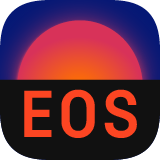EOS is a software package that addresses several use cases in the field of high-energy flavor physics:
- theory predictions of and uncertainty estimation for flavor observables within the Standard Model or within the Weak Effective Theory;
- Bayesian parameter inference from both experimental and theoretical constraints; and
- Monte Carlo simulation of pseudo events for flavor processes.
An up-to-date list of publications that use EOS can be found here.
EOS is written in C++20 and designed to be used through its Python 3 interface, ideally within a Jupyter notebook environment. It depends on as a small set of external software:
- the GNU Scientific Library (libgsl),
- a subset of the BOOST C++ libraries,
- the Python 3 interpreter.
For details on these dependencies we refer to the online documentation.
EOS supports several methods of installation. For Linux users, the recommended method is installation via PyPI:
pip3 install eoshep
Development versions tracking the master branch are also available via PyPi:
pip3 install --pre eoshep
For instructions on how to build and install EOS on your computer please have a look at the online documentation.
If you want to report an error or file a request, please file an issue here. For additional information, please contact any of the main authors, e.g. via our Discord server.
The main authors are:
- Danny van Dyk danny.van.dyk@gmail.com,
- Frederik Beaujean,
- Christoph Bobeth christoph.bobeth@gmail.com,
- Nico Gubernari nicogubernari@gmail.com,
- Meril Reboud merilreboud@gmail.com,
with further code contributions by:
- Marzia Bordone,
- Thomas Blake,
- Lorenz Gaertner,
- Elena Graverini,
- Stephan Jahn,
- Ahmet Kokulu,
- Viktor Kuschke,
- Stephan Kürten,
- Philip Lüghausen,
- Bastian Müller,
- Filip Novak,
- Stefanie Reichert,
- Eduardo Romero,
- Rafael Silva Coutinho,
- Ismo Tojiala,
- K. Keri Vos,
- Christian Wacker.
We would like to extend our thanks to the following people whose input and support were most helpful in either the development or the maintenance of EOS:
- Gudrun Hiller
- Gino Isidori
- David Leverton
- Thomas Mannel
- Ciaran McCreesh
- Hideki Miyake
- Konstantinos Petridis
- Nicola Serra
- Alexander Shires


